On this page you will find information on:
Message from Cindy
Welcome to the September edition of Volunteer Voice! Spring is here, and to enter this season in full bloom, I am excited to share our Daffodil Day highlights with you. This year, the event celebrated 32 years of turning Australia yellow, 32 years of raising funds for vital cancer research!
On the topic of research, we are very proud of our General Manager, Research, Professor Joanne Aitken, who is among the six new members of the Cancer Australia Advisory Council.
In other exciting news, 92 students at St Margaret’s Anglican School selflessly cut off their ponytails to raise funds as part of Ponytail Project. Can you believe they raised over $91000?! It is initiatives like this, and the generosity of our supporters, volunteers, donors and fundraisers, that we are able to work across every aspect of cancer from research to prevention and support. Thank you!
Keep the feedback coming in! Get in touch by email or call the Volunteer Engagement Team on 1300 851 957
Best wishes
Cindy
Senior Manager Volunteer Engagement
Daffodil Day 2018
We would like to extend a huge THANK YOU to every single person who made Daffodil Day such a success! Here are a few highlights from the day!
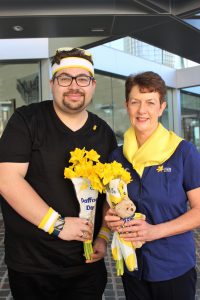
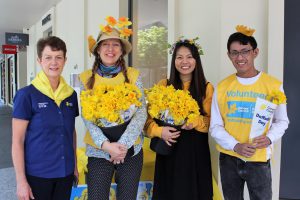
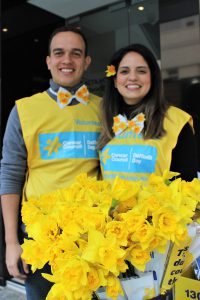
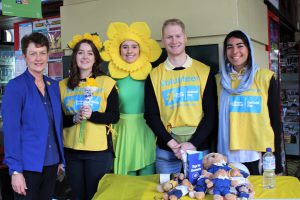
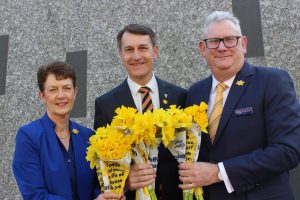
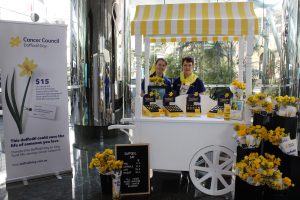
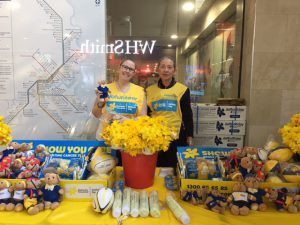
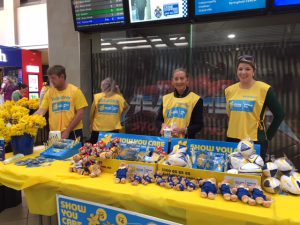
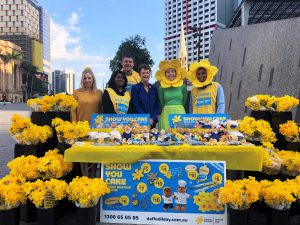
Ponytail Project
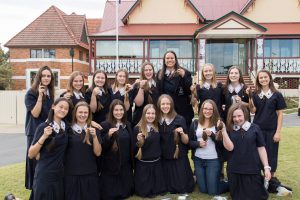
In a demonstration of selfless philanthropy by students at St Margaret’s Anglican Girls School Brisbane, 92 ponytails were chopped and $91,000 was raised for CCQ as part of the #PonytailProject
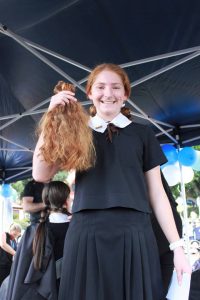
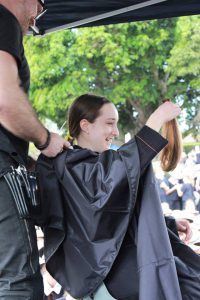
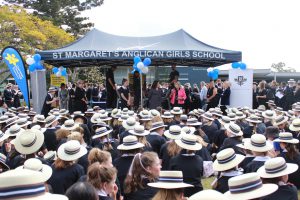
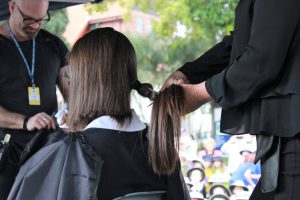
To register or contribute to the St Margaret’s team tally visit www.ponytailproject.com.au.
Appointment to the Cancer Australia Advisory Council
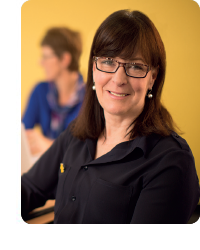
Minister of Health, the Honourable Greg Hunt MP, announced on Friday the appointment of six new members of the Cancer Australia Advisory Council, including Cancer Council Queensland’s own General Manager, Research, Professor Joanne Aitken.
As a distinguished research scientist, Professor Aitken’s three year appointment is well-deserved recognition of the impact her work in the field of cancer epidemiology has had in the past 25 years.
The Cancer Australia Advisory Council provides strategic advice to support Cancer Australia in the performance of its functions.
This includes providing national leadership to reduce the impact of cancer, addressing disparities and improving outcomes for people affected by cancer.
Get informed about prostate cancer

September was Prostate Cancer Awareness Month and we’re urging men to help raise awareness of the disease and better understand their risk to help detect it early.
Ensure you are informed by reading the below five important points.
One, it’s the most common form of cancer in Queensland men. The approximate lifetime risk for a Queensland male to be diagnosed with prostate cancer before the age of 85 is one in five. It makes up 26 per cent of all male cancers and 12 per cent of male cancer deaths.
Two, genetics matter. Men with a family history have an increased risk of developing the disease. If your father or brother has had prostate cancer – your risk will be twice that of other men. Or, if you have a strong family history of breast or ovarian cancer, particularly BRCA1 or BRCA2 gene mutations, your risk is also increased.
Three, risk increases with age. Prostate cancer is most commonly diagnosed in men aged between 60 and 79, with the risk rapidly increasing for men aged over 50.
Four, it’s important to discuss any changes to your body with your general practitioner. Early prostate cancer generally does not produce any symptoms. Any change you may experience, is worth a discussion with your GP. A number of other non-cancerous conditions can affect men and produce symptoms, so it is better to get them checked out!
Five, understand your risk and talk to your GP about any concerns you may have. Understanding your risk will help to determine what you do next. While there is no single, simple test to detect prostate cancer, it is important that Queensland men understand their risk and discuss testing with their GP. It is important to be informed before making any decision about your health.
Being diagnosed with cancer or supporting a family member or friend can leave you with many questions, so please know you don’t have to face cancer alone – we’re here to help.
Call 13 11 20 to speak to a member of Cancer Council Queensland’s Cancer Information and Support Team to access information or confidential support and referrals.
Q&A with Dr Kate Gartlan, Senior Research Officer, QIMR Berghofer Medical Research Institute

We sat down with Dr Kate Gartlan, to find out more about her Cancer Council Queensland funded research.
What is your area of research?
I am very interested in the pathways and mechanisms that drive inflammation, which are important in a broad range of diseases including cancer, autoimmunity and infection. Over the last 5 years I have been researching inflammatory responses following bone marrow transplantation with the aim to improve this treatment for blood cancer patients.
Why were you attracted to this area of research?
For many leukemia patients a donor bone marrow transplant is the only curative treatment, however the inflammatory complications can be very severe for some people. It is a very interesting and important problem that needs more study.
Can you tell me about the Cancer Council Queensland funded project you’re working on at the moment?
Complications arise in most recipients of a bone marrow transplant due to graft-versus-host-disease (GVHD). We have identified a protein that appears to play an important protective role early after transplant that limits inflammation and tissue damage. This study aims to understand how this pathway can prevent damaging immune responses and potentially harness this knowledge to develop new therapeutic approaches.
What do you hope the outcome of this project will be?
Once we understand how this protective pathway works, I hope to use this knowledge to develop new treatment approaches to help improve outcomes for these patients.
How will this have an impact on cancer patients?
By improving bone marrow transplantation and reducing the complications associated with this important cancer therapy, this will improve quality-of-life for cancer survivors and enable the application of this treatment to be broadened to a larger patient population.
Why is research so important?
Medical research is very important to not only help identify new treatments for cancer patients, but also to improve existing therapies. It is through many incremental and sometimes major, advances in our understanding of how our bodies work we can come up with new strategies to help when things don’t quite function as they should.
What drew you to a career in science?
I have always been a keen scientist since my early teens, this was probably inspired by some terrific teachers and a strong attraction to problem solving and technical detail.
What do you like about being a researcher?
I really enjoy the problem-solving elements to medical research. We study systems that thousands of people around the world study in parallel and we are still only part way there to nutting out how it all works. Contributing to this and making advances that could improve outcomes for patients is very rewarding work.
What are you most proud of in your research career?
I am proud of my work and contributions to studies ranging from basic biology, drug development all the way to clinical trials for new therapies. I am also proud of all the students and junior staff I have worked with and trained, I love watching them develop their skills and understanding.
What is your hope for the future?
I hope that my research can have a direct effect on improving people’s lives.
What’s your message to CCQ donors and supporters?
Whatever your motivation is for donating or spending your time fundraising and raising awareness for cancer research, it is very much appreciated. The research community really can’t do this without you!
Why is the funding that CCQ provides so important?
CCQ project grant funding is awarded to a broad range of research ideas and studies that would likely not be investigated without it. It can provide early proof of concept data for larger future studies or even help gather the very last important pieces to complete a study.
What does it mean to you that people donate or volunteer towards cancer research?
It always impresses me that people find the time/space in their lives to get out there and support cancer research. It means an enormous amount to the researchers who rely on this type of funding to continue their work.
Did you know?
In 2017, CCQ invested $10.9 million into lifesaving research.
We fund more cancer research than any other independent community-based charity in Queensland.
Thanks to research into cancer prevention, treatment and management, more than 19,500 cancer deaths were avoided between 1995 and 2014.
For the first time, the five-year relative survival rate from cancer in Queensland is more than 70 per cent.
Meet Sandra, Wig and Turban Volunteer, Sunshine Coast
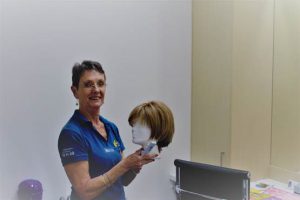
What does your role involve?
I fit wigs and turbans at Cancer Council Queensland’s Maroochydore office.
Tell us a little bit about yourself?
I’m a qualified hairdresser. I trim the wigs where needed and I’m dressmaker so I make some of the headgear.
Why did you decide to get involved with CCQ? What was your motivation for volunteering?
I went to an Australia’s Biggest Morning Tea, the lady talking about what Cancer Council Queensland does said that wig and turban volunteers were needed. I’ve also had so many friends with different cancers, some have passed on. So I thought I can do that! Over five years on I’m still doing it, and loving it.
What do you love most about your volunteer role?
Being of some help to ladies whose world has been turned upside down by cancer.
What has surprised you in your role?
The amount of ladies we’ve had and the number of younger ladies coming in and even men. Also the amount of different cancers, I had no idea.
What has been the most inspiring or memorable moment you’ve had since starting with CCQ?
The change on someone’s face when they leave with a good looking wig and head gear. They come in a bit apprehensive and not sure they are going to find what they want, then I can put them at ease and show them how easy the wigs are to manage and show them how to tie scarves and find some good looking head gear.
What is your hope for the future? What do you hope your volunteering will achieve for cancer and CCQ?
That a cure will be found for all sorts of cancers, and that I can give the ladies some dignity while they’re going through their treatment.
What would you say to someone who was thinking about volunteering with CCQ?
To just do it! It is so rewarding!
What do you feel you’ve gained through volunteering for CCQ?
A sense of achievement in helping someone to cope through some tough times. Some knowledge of cancers and treatments.
If you are inspired by Sandra’s story and want to become a Wig and Turban Service volunteer, we’re currently recruiting for volunteers in the Brisbane area.
Our Wig and Turban Service aims to assist individuals with the side-effects of hair loss as a result of their cancer treatment. You will be providing people with the information that they need about the service, styling and fitting wigs and where appropriate giving people the opportunity to talk about their experiences and concerns. We’re looking for people who have empathy, strong listening skills and the ability to refer complex issues.
To apply for the role, please visit our volunteer opportunities page.
